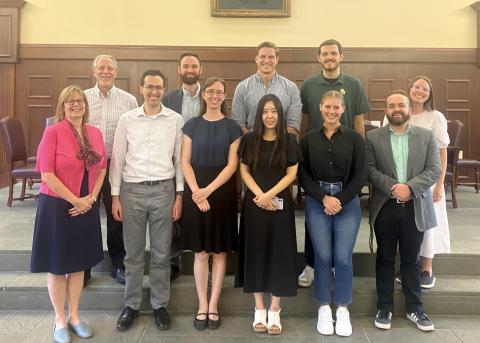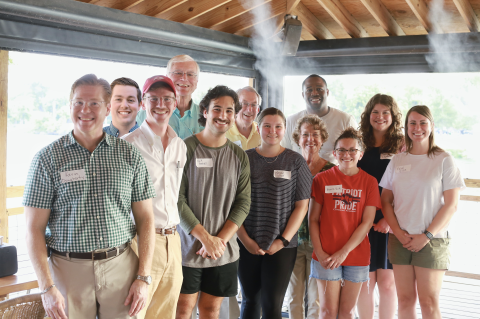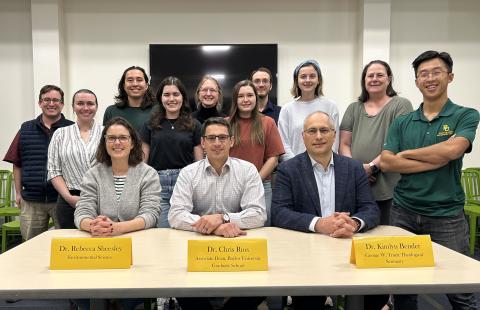Christopher M. Rios, Laine Scales, & Maggi Jones
Rios: Associate Dean for Enrollment Management
Scales: Professor of Social Work
Jones: PhD Candidate in Religion
What does it mean to be a Christian research university, and what difference does it make? These questions were the theme of a faculty panel sponsored by Provost Brickhouse at her first summer deans’ retreat in 2019. The panelists—representing disciplines from the STEM, humanities, and social science fields—offered personal reflections about how they viewed the significance of Baylor’s distinctive identity. Their comments demonstrated both the seriousness with which our faculty take our Christian identity as well as the range of perspectives about what it means for their teaching and research.
What does being a Christian research university mean for the Graduate School? For one thing, it means we strive to embody this identity with intentionality and an understanding of our students’ distinct needs and expectations. Compared to our undergraduates, Baylor’s graduate students are much more religiously and culturally diverse. They are more likely to come from many faiths or even none. Many are more concerned with the professional and educational opportunities we provide than Baylor’s Christian identity. And even for those who share our Christian faith, they are older, more likely to be married and have a family, and thus more likely to have a wider range of commitments demanding their time and attention. Their spiritual and religious needs and expectations are simply different.
Over the past two decades, we have experimented with numerous strategies to encourage our students’ faith development. Three programs continue to resonate: our Conyers Scholars, Baptist College and University (BCU) Scholars, and Ramm Scholars programs. These year-long programs engage students in sustained exploration of questions related to their faith and vocation. In doing so, they provide an opportunity for a distinct kind of theological education and reflection that enhances their broader scholarly development.
Conyers Scholars
The Conyers Scholars program invites doctoral students from various disciplines and traditions to explore questions regarding faith, scholarship, teaching, and the relationship between the church and the university. The program—named in honor of A.J. “Chip” Conyers (1994-2004), one of the founding faculty of Truett Theological Seminary—asks students to consider their academic career as a Christian vocation. Participants meet monthly for dinner and book discussions in hopes of fulfilling Baylor’s mission to provide doctoral students with the knowledge and perspectives to serve as Christian scholar-teachers in the academy. Through engaging in meaningful conversations and fostering a community of intellectual curiosity, the Conyers Scholars program encourages participants to reflect on how their unique academic journeys contribute to the broader narrative of integrating faith, learning, and service within the academic sphere.
I thrive on being part of a small community of like-minded people, and being part of a group devoted to faith and learning will help me focus on my ultimate reasons for pursuing a life of teaching and learning.
— Justice Flint, second-year PhD student in English and current Conyers Scholar
BCU Scholars
The BCU Scholars program focuses on the formation of scholars who desire to begin their careers in a Baptist institution. It is a collaboration between the Graduate School, the International Association of Baptist Colleges and Universities (IABCU), and IABCU member schools. The program identifies alumni from IABCU schools and helps prepare them for careers in Baptist higher education. BCU Scholars learn to incorporate their faith identity with their academic work through various events and opportunities—including regular group meetings, workshops on integrating faith and learning, and funding to attend at least one IABCU annual meeting to connect with faculty and administrators of Baptist colleges and universities. The BCU Scholars program provides tailored resources, such as workshops on educational philosophies and faith integration, to equip them with the essential skills needed to seamlessly weave their faith identity into the fabric of their academic endeavors within Baptist institutions.
Our participation in the BCU program is a signal to Baptist schools that we are serious about our Baptist identity and we’re serious about wanting to contribute to the work that Baptist schools do, both in terms of education, but also the work that Baptist schools do for the church.
— Dr. Rebecca Poe Hays, Assistant Professor of Christian Scriptures at Truett Theological Seminary and BCU Scholars alumna
Ramm Scholars
The Ramm Scholars program, sponsored by the Graduate School and Truett Seminary, is open to doctoral STEM students and M.Div. students who are interested in the relationship between faith and science. Named in honor of theologian Bernard Ramm (1916-1992), a one-time Baylor faculty member whose work helped shape the contemporary evangelical engagement with science, the program aims to help future scientists and ministers be well-informed, compassionate voices on issues faced by both the academy and the church. Ramm Scholars engage in interdisciplinary dialogues, bridging the gap between science and theology, through specialized seminars and collaborative research opportunities, fostering a holistic understanding of the intersections between faith and the scientific enterprise.
Through this program, I have been able to examine, refine, and express my understanding of where and how religion and science interact, as well as see how my view compares with those of a diverse group of my peers. From these discussions, I feel better equipped to serve as a guide for others who are just starting to navigate the impact of science and popular scientific interpretation on their faith.
— Jacob Hatvany, fifth-year PhD student in Chemistry & Biochemistry and current Ramm Scholar
The longstanding success of these programs makes clear that many graduate students care about deepening their faith at Baylor. In response, the Graduate School will continue to provide spaces and opportunities to explore important questions and enrich our understanding of what it means to be a Christian scholar.


